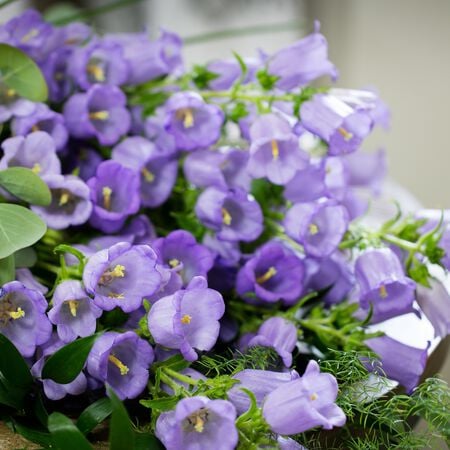Champion Pro Lavender, (F1) Campanula Seeds
Key Attributes
Key Attributes
Product Details
Weight
.008Plant Height
36-40"Botanical Name
Campanula mediumFlower Height
36-40"Seed Type
Pelleted SeedAdditional Characteristics
Deer ResistantSeeds Per Gram
992Seeds Per Pound
449,600Packet
15 SeedsSow Depth
1/8"Seeds Per Ounce
28,100Breed
F1 HybridSun
Full SunGrowing Conditions
Cut Flower, BordersUses
Cut FlowersLife Cycle
AnnualSow Method
TransplantCategories
FlowersDays To Maturity (# Days)
130Components
Growing Instructions
![]() Learning Download: How to Grow Campanula
Learning Download: How to Grow Campanula
Campanula, also referred to as bellflowers due to the usually bell-shaped blossoms, have annual, perennial and biennial varieties. Some varieties have blooms shaped like a star or a cup.
Before Planting: Begin Campanula seeds indoors up to eight weeks before the last frost. Plant the seeds in planting cells, placing three to four seeds per cell. Place in a sunny area and keep the soil moist.
Planting: Once seedlings reach 4 inches, you can decide if you want to transplant them outside into the garden. Space the plants 7 inches apart for smaller varieties and 15 inches apart if they are a bigger variety.
Watering: The soil should be kept moist, but not too soggy.
Fertilizer: Feed the Campanula once a month with an 10-10-10 liquid-based fertilizer.
Days to Maturity: Campanula flowers typically aren’t used as cut flowers, but they will produce seed pods in the fall.
Harvesting: Snip off the seed capsules and place them in a paper bag. You can plant the seeds immediately or save them until the spring.
Tips: Some Campanula varieties will not bloom their first year.
Shipping Schedule
Our Seed Promise
 "Agriculture and seeds" provide the basis upon which our lives depend. We must protect this foundation as a safe and genetically stable source for future generations. For the benefit of all farmers, gardeners and consumers who want an alternative, we pledge that we do not knowingly buy or sell genetically engineered seeds or plants.
"Agriculture and seeds" provide the basis upon which our lives depend. We must protect this foundation as a safe and genetically stable source for future generations. For the benefit of all farmers, gardeners and consumers who want an alternative, we pledge that we do not knowingly buy or sell genetically engineered seeds or plants.
The mechanical transfer of genetic material outside of natural reproductive methods and between genera, families or kingdoms, poses great biological risks as well as economic, political, and cultural threats. We feel that genetically engineered varieties have been insufficiently tested prior to public release. More research and testing is necessary to further assess the potential risks of genetically engineered seeds. Further, we wish to support agricultural progress that leads to healthier soils, to genetically diverse agricultural ecosystems, and ultimately to healthy people and communities.
To learn more about the "Safe Seed Pledge" please visit www.councilforresponsiblegenetics.org.

